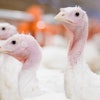Ohio State University is receiving a $1.46 million grant from the USDA’s National Institute of Food and Agriculture (NIFA) to develop knowledge-based integrated approaches to detect, control, and prevent poultry respiratory diseases in the United States through new and improved diagnostic tools, vaccines, and novel preventive measures.
The grant is one of three grants announced on April 13 by NIFA that are designed to boost food security by minimizing livestock losses to insects and diseases. The awards to support research, education, and Extension efforts were made through NIFA's Agriculture and Food Research Initiative (AFRI), which is authorized by the 2014 Farm Bill.
NIFA made the awards through the AFRI Food Security challenge area, which seeks to increase sustainable food production. Priority was given to projects that will improve prevention, early detection, rapid diagnosis, or recovery from new, foreign, or emerging diseases or arthropods that have the potential to cause major impacts on food security.
Other grants announced by NIFA include $47,464 to Mississippi State University and a $1.48 million grant to the University of Vermont.
The grant to Mississippi State is for a project to create a portable computer and communication center for training veterinary students, graduate students, practicing veterinarians, and other food production stakeholders to use system dynamics modeling, other forms of stochastic and deterministic modeling and health data management or analysis software to protect livestock from pests and disease.
The University of Vermont grant is for a study to reduce the impact of new, emerging and foreign pests and diseases to domestic production of cattle, swine and small ruminant foods and byproducts.
"These grants will allow scientists to discover the new tools and technologies necessary to deal with the threats insects and pathogens pose to livestock production in our nation, which ultimately benefit consumers through abundant, affordable food." said Sonny Ramaswamy, NIFA director.
















